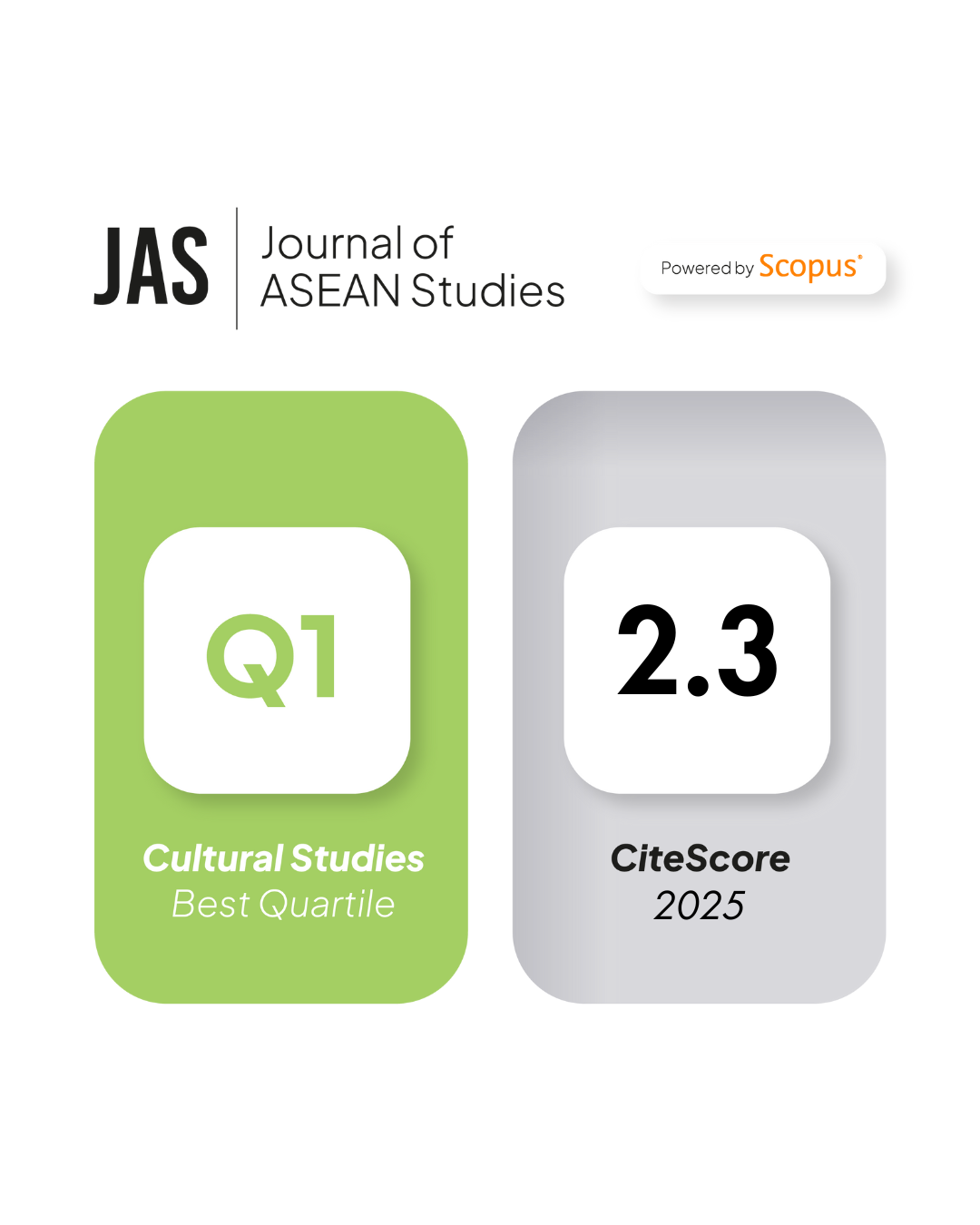Political Leadership in South Korea’s Developmental State: A Historical Revisit
DOI:
https://doi.org/10.21512/jas.v6i1.4927Keywords:
developmental state, South Korea, Park Chung Hee, modernization, leadershipAbstract
South Korea under President Park Chung Hee underwent rapid industrialization and experienced phenomenal economic growth making the country one of the Asian Tigers alongside Hong Kong, Taiwan, and Singapore. Had suffered by the long-standing Japanese colonialization, South Korea’s development strategies in its incipient economic venture, interestingly, postulate unforeseen similarities with those imposed by Japan primarily during the phenomenal industrial revolution of the Meiji government (1868-1912). Exponential modernization in South Korea was substantially forged by the implementation of ‘developmental state’ model. The term was initially coined by Johnson (1982) to explain the pacification of government policies – rather than market – to achieve successful economic rejuvenation of post-war Japan. In light to this historical paradox between South Korea and Japan, this article attempts to revisit the embarking point of South Korea’s rapid economic development beginning in the 1960s by drawing attention to the importance of leadership as one of the major components of the developmental state model. It concludes that Park Chung Hee’s strong Japanese linkage combined with his pretext for imposing ‘hard authoritarianism’ is particularly influential in determining South Korea’s pragmatic development trajectory.
References
Alexander, A. (2008). The Arc of Japan's Economic Development. Oxon: Routledge.
Asia Society. (n.d.). Korean History and Political Geography. Retrieved December 28, 2010, from Asia Society Web site: http://asiasociety.org/countries-history/traditions/korean-history-and-political-geography
Bedeski, R. (1994). The Transformation of South Korea: Reform and Reconstruction in the Sixth Republic under Roh Tae Woo 1987-1992. London: Routledge.
Beeson, M. (2009). Developmental States in East Asia: A Comparison of the Japanese and Chinese Experiences. Asian Perspective, 3(2), 9.
Breen, M. (1997). The Koreans: Who They Are, What They Want, Where Their Future Lies. London: Routledge.
Buzo, A. (2007). The Making of Modern Korean. London: Routledge.
Cumings, B. (1984). The Legacy of Japanese Colonialism in Korea. In B. Cumings, The Japanese Colonial Empire: 1895-1945 (p. 479). Princeton: Princeton University Press.
Douglass, M. (1994). The 'Developmental State' and the Newly Industrialised Economies of Asia. Environmental and Planning, 26, 534-566.
Eckert, C. J. (1991). Korea Old and New: A History. Cambridge: Harvard University Press.
Eckert, C. J. (1996). Total War, Industrialization and Social Change in Late Colonial Korea. In R. H. Myers, M. R. Peattie, & eds. (Eds.), The Japanese Wartime Empire, 1931-1945. Princeton: Princeton University Press.
Evans, P. (1995). Embedded Autonomy: States and Industrial Transformation. Princeton: Princeton University Press.
Han, S.-J. (2001). Modernization and the Rise of Civil Society: The Role of the "Middling Grassroots" for Democratization in Korea. Human Studies, 24(1), 113-132.
Han, S.-m. (2004). Community Movement: Park Chung Hee and the Making of State Populism in Korea. Pacific Affairs, 77(1).
Hayashi, S. (2010). The Developmental State in the Era of Globalization: Beyond the Northeast Asian Model of Political Economy. The Pacific Review, 23(1), 45-69.
Hirono, R. (1988). Japan: Model for East Asian Industrialization. In H. Hughes, Achieving Industrialization in East Asia (p. 241). Cambridge: Cambridge University Press.
Kim, B.-k. (2011). Introduction: The Case for Political History. In B.-k. Kim, & E. Vogel (Eds.), The Park Chung Hee Era: The Transformation of South Korea. Cambridge: Harvard University Press.
Kim, H.-A. (2004). Korea's Development under Park Chung Hee: Rapid Industrialization, 1961-1979. London: Routledge.
Kim, K. (2006). The Development of Modern South Korea: State Formation, Capitalist Development, and National Identity. Oxon: Routledge.
Kim, M., & Jaffe, S. (2010). The New Korea: An Inside Look at South Korea's Economic Rise. New York: American Management Association.
Kim, M., & Jaffe, S. (2010). The New Korea: An Inside Look at South Korea's Economic Rise. New York: AMACOM.
Kim, Y. (2007). Neoliberalism and the Decline of the Developmental State. Journal of Contemporary Asia, 29(4), 441-461.
Kleiner, J. (2001). A Century of Change. New Jersey: World Scientific Publishing Co. Ptc. Ltd.
Kohli, A. (2004). State-Directed Development: Political Power and Industrialization in the Global Periphery . Cambridge: Cambridge University Press.
Lee, C. (1985). Japan and Korea: The Political Dimension. Stanford: Hoover Institution Press.
Lee, H. (2014). A Comparative Study of East Asian Capitalism. Berkeley: IEAS Publication.
Lee, Y. (1997). The State, Society and Big Business in South Korea. London: Routledge.
Leftwich, A. (1995). Bringing Politics Back In: Towards A Model of the Developmental State. The Journal of Development Studies, 31(3), 400-427.
Macpherson, W. (1987). The Economic Development of Japan: 1868-1941. Cambridge: Cambridge University Press.
Mason, E. S. (1980). The Economic and Social Modernization of the Republic of Korea. Cambridge: Harvard University Press.
Moon, C.-I., & Prasad, R. (1994, October). Beyond the Developmental State: Networks, Politics, and Institutions. Governance: An International Journal of Policy and Administration, 7(4), 360-386.
Mosk, C. (2008). Japanese Economic Development: Markets, Norms, Structures. Oxon: Routledge.
Palais, J. (1995). A Search for Korean Uniqueness. Harvard Journal of Asiatic Studies, 55(2).
Pang, E.-S. (2000). The Financial Crisis of 1997-98 and the End of the Asian Developmental State. Contemporary Southeast Asia, 22(3), 570-593.
Piric, I. (2008). The Korean Development State: From Dirigisme to Neo-Liberalism. London: Routledge.
Setton, M. (1997). Cong Yagyong: Korea's Challenge to Orthodox Neo-Confucianism. Albany: State University of New York Press.
Tønnesson, S. (2017). Peace by Development. In E. Bjarnegård, & J. (. Kreutz, Debating the East Asian Peace: What it is. How it came about. Will it last? (pp. 55-77). Copenhagen: NIAS Press.
Wong, J. (2004). The Adaptive Developmental State in East Asia. Journal of East Asian Studies, 4, 345-362.


























